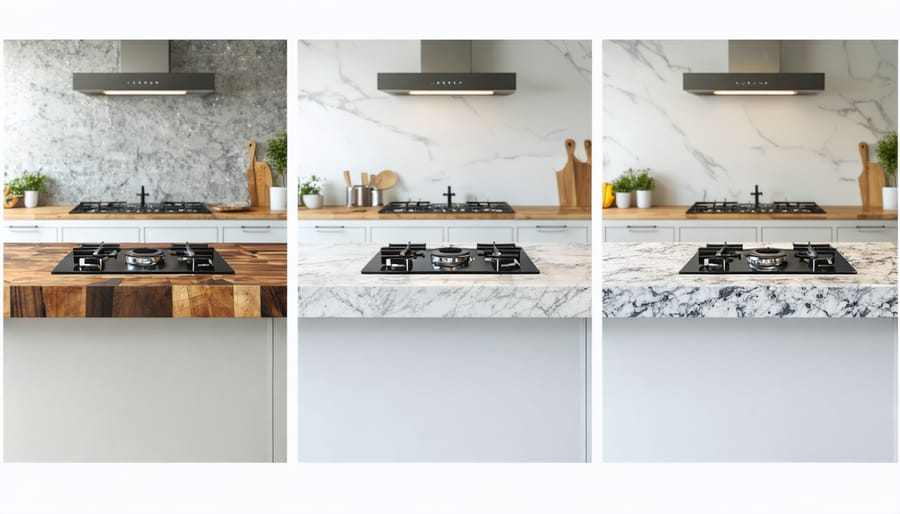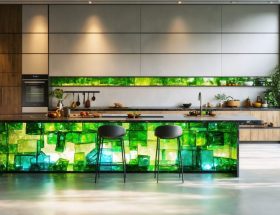Choosing the perfect countertop material demands a delicate balance between budget and long-term value. While granite and quartz dominate luxury kitchens, savvy homeowners increasingly turn to high-performance alternatives that deliver exceptional durability without breaking the bank. Butcher block offers warmth and functionality at $40-100 per square foot, while engineered quartz combines elegant aesthetics with near-indestructible performance at $55-125 per square foot. Meanwhile, traditional laminate has evolved dramatically, now featuring realistic stone patterns and impressive durability at just $25-50 per square foot.
The true value of a countertop extends far beyond its initial price tag. Premium materials like quartz and granite command higher upfront costs but often prove more economical over decades of use, requiring minimal maintenance and retaining their beauty. In contrast, budget-friendly options like laminate and tile can deliver impressive short-term savings but may need replacement sooner. By evaluating factors like durability, maintenance requirements, and resale value alongside purchase price, homeowners can identify the countertop material that delivers optimal return on investment for their specific needs and lifestyle.
Understanding Value: Beyond Just the Price Tag
Initial Cost vs. Lifetime Value
When evaluating countertop materials, it’s crucial to look beyond the initial price tag and consider the total cost of ownership. While materials like laminate offer lower upfront costs, premium options such as granite and quartz often provide better long-term value through their extended lifespan and minimal maintenance requirements. A comprehensive durability comparison between materials reveals that high-quality natural stone countertops can last 20-30 years or more with proper care, compared to 10-15 years for budget alternatives.
Consider this: a $2,000 granite countertop that lasts 25 years costs about $80 per year, while a $800 laminate countertop requiring replacement after 12 years amounts to roughly $67 annually – not accounting for maintenance costs and potential repairs. Additionally, premium materials like quartz and granite typically increase property value, offering potential returns during resale. When factoring in durability, maintenance requirements, and resale value, investing in higher-quality materials often proves more economical in the long run, despite higher initial costs.
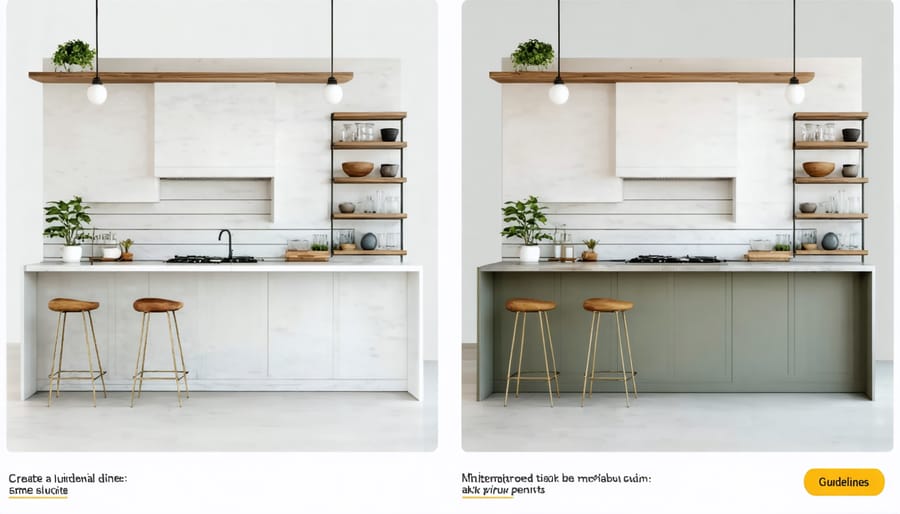
Top Value-for-Money Countertop Materials
Quartz: The Durability Champion
When it comes to getting the most value for your money, engineered quartz consistently ranks at the top of the list. The benefits of quartz countertops extend far beyond their stunning appearance, making them a smart long-term investment for homeowners.
Composed of 90-95% natural quartz crystals combined with polymer resins, these engineered surfaces offer exceptional durability that outperforms most natural stone options. Unlike granite or marble, quartz resists scratches, chips, and stains without requiring sealing or special maintenance. This inherent durability translates to lower lifetime maintenance costs and fewer repairs.
What truly sets quartz apart is its non-porous nature. This characteristic makes it virtually impervious to bacteria growth and staining, ensuring your countertops remain hygienic and pristine with minimal effort. Daily cleaning requires nothing more than soap and water, eliminating the need for expensive specialty cleaners.
While the initial cost of quartz may be higher than some alternatives, typically ranging from $60 to $100 per square foot installed, its longevity and low maintenance requirements often result in better long-term value. Many manufacturers offer warranties of 15 years or longer, demonstrating their confidence in the material’s durability.
Factor in the wide range of consistent colors and patterns available, and quartz emerges as an ideal choice for homeowners seeking a beautiful, practical, and cost-effective countertop solution that will maintain its value for years to come.
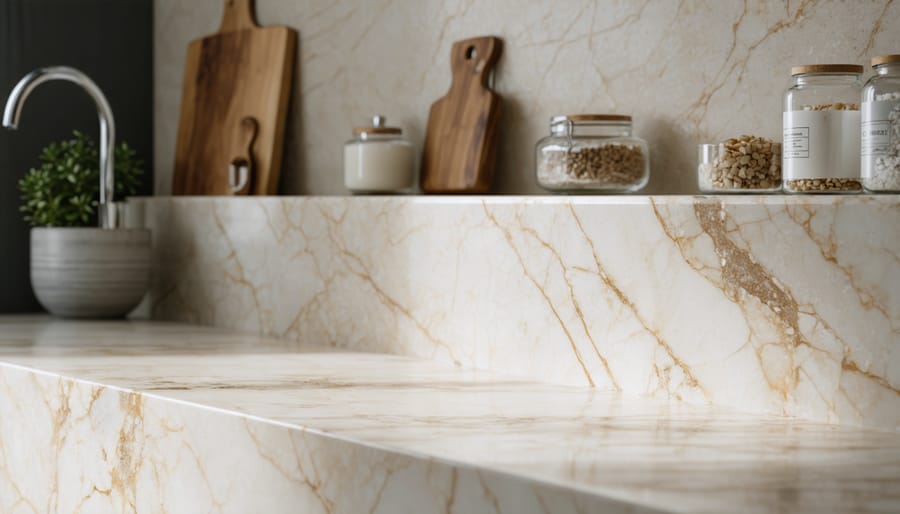
Granite: Natural Beauty Meets Longevity
Granite remains a top contender in the value-for-money category, offering an impressive blend of durability and aesthetic appeal that has stood the test of time. When considering the lifetime value of your investment, choosing the right granite can provide decades of service while maintaining its beauty and functionality.
With prices ranging from $40 to $100 per square foot installed, granite offers remarkable value considering its longevity. The initial investment might be higher than some synthetic alternatives, but the material’s resistance to heat, scratches, and daily wear makes it exceptionally cost-effective over time. Premium grades can last 50 years or more with proper maintenance, effectively reducing the annual cost of ownership to a fraction of less durable options.
The material’s natural variations and unique patterns ensure that each installation is one-of-a-kind, adding significant value to your property. While basic maintenance includes annual sealing and daily cleaning with appropriate products, these costs are minimal compared to the material’s lifespan. Additionally, granite’s timeless appeal helps maintain property value, making it an attractive feature for potential buyers.
For budget-conscious consumers, entry-level granite options provide similar durability benefits at more accessible price points, though with less exotic patterns and colors. This flexibility in pricing allows homeowners to balance their aesthetic preferences with their budget constraints while still securing granite’s inherent benefits.
Butcher Block: Affordable Warmth
Butcher block countertops offer a unique combination of warmth, functionality, and affordability that makes them an attractive option for budget-conscious homeowners. Made from strips of hardwood glued together, these countertops typically cost between $30 to $60 per square foot installed, positioning them as one of the more economical premium countertop choices.
The appeal of butcher block extends beyond its price point. The material brings natural warmth and character to kitchens, developing a rich patina over time that many homeowners find appealing. Maple, oak, and walnut are popular choices, each offering distinct grain patterns and color variations.
From a practical standpoint, butcher block countertops are easily maintainable and repairable. Minor scratches and burns can be sanded out, and the entire surface can be refinished multiple times, extending its lifespan significantly. While they require regular oiling to maintain their water resistance, this maintenance is straightforward and cost-effective.
However, buyers should consider some limitations. Butcher block is susceptible to water damage if not properly sealed and maintained. It can also show knife marks and stains more readily than other materials, though many view these imperfections as part of the material’s natural charm.
For those seeking a balance between cost and character, butcher block represents an excellent value proposition, particularly in craftsman-style or rustic kitchen designs where its natural warmth enhances the overall aesthetic.
Innovative Alternatives
Recent innovations in countertop materials have introduced compelling alternatives that offer excellent value without compromising on aesthetics or durability. Engineered porcelain slabs, for instance, provide remarkable heat and scratch resistance while costing 20-30% less than premium natural stones. These surfaces can authentically mimic marble and other luxury materials at a fraction of the cost.
Sintered surfaces, made through advanced particle technology, represent another breakthrough. These materials offer exceptional durability, zero porosity, and UV resistance, making them ideal for both indoor and outdoor applications. While their initial cost is comparable to mid-range granite, their longevity and minimal maintenance requirements translate to better long-term value.
Recycled glass countertops combine sustainability with striking aesthetics. Made from post-consumer glass embedded in concrete or resin, these surfaces offer unique patterns and colors while typically pricing 15-25% below high-end natural stone options. They’re particularly resistant to stains and scratches, requiring minimal upkeep.
Large-format porcelain tiles are gaining traction as a cost-effective alternative. When properly installed with minimal grout lines, they can create a seamless look similar to solid surface materials. At roughly half the cost of natural stone, these surfaces offer excellent heat resistance and durability, though careful installation is crucial for optimal results.
These innovative materials demonstrate how advancing technology continues to create valuable alternatives for budget-conscious consumers seeking quality countertop solutions.
Cost Comparison and ROI Analysis
When evaluating countertop materials, a comprehensive cost analysis reveals significant variations in both initial investment and long-term value. Entry-level laminate countertops typically range from $20-$50 per square foot installed, making them the most budget-friendly option. However, they may need replacement within 10-15 years, affecting their lifetime value.
Mid-range materials like butcher block ($40-$100/sq ft) and granite ($50-$150/sq ft) offer better durability and ROI. Granite, in particular, can last decades with proper maintenance and typically returns 80-100% of its cost during home resale.
Premium options like quartz ($60-$200/sq ft) and marble ($75-$250/sq ft) command higher initial investments but offer distinct advantages. Quartz requires minimal maintenance and rarely needs replacement, making it cost-effective over time despite the higher upfront cost. Marble, while beautiful, requires more maintenance and may develop patina, which some consider adds character but others view as wear.
When calculating ROI, consider these factors:
– Installation costs (some materials require professional installation)
– Maintenance expenses (sealing, special cleaners)
– Durability and expected lifespan
– Impact on home resale value
– Repair costs if damaged
For the best value, engineered stone like quartz and mid-range granite often provide the optimal balance between cost and benefits. These materials offer excellent durability, minimal maintenance requirements, and strong resale value. While their initial cost is higher than laminate or tile, their longevity and performance make them more economical over time.
Budget-conscious homeowners might consider hybrid approaches, such as using premium materials in high-visibility areas while choosing more affordable options for less prominent spaces, maximizing both impact and value.
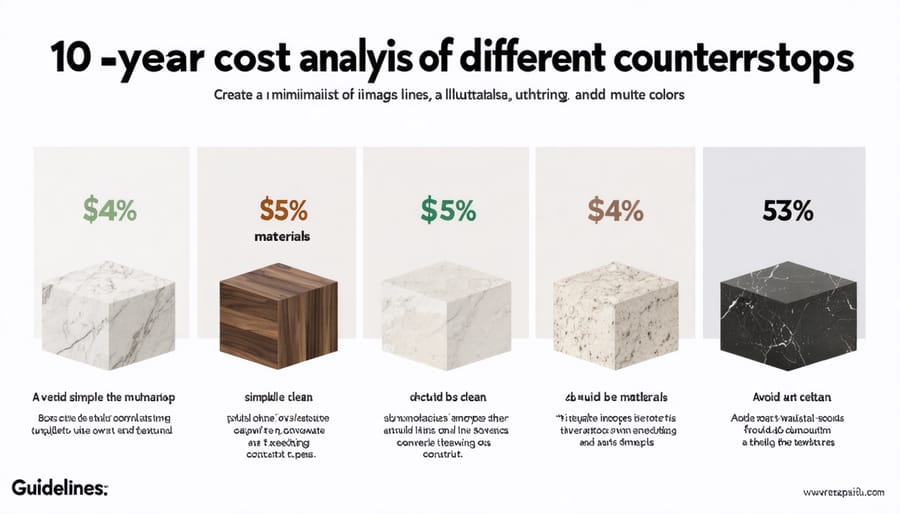
Making the Smart Choice
Making the best value choice in countertop materials requires careful consideration of several key factors beyond just the initial price tag. Start by assessing your lifestyle needs and how you use your kitchen. If you’re an avid cook, consider materials like granite or quartz that offer superior heat resistance and durability. For busy families, low-maintenance options like quartz might justify a higher upfront cost through reduced care expenses over time.
Set a realistic budget that accounts for both material and installation costs. While laminate offers the lowest initial investment at $20-50 per square foot, mid-range options like butcher block ($40-100) and granite ($50-150) often provide better long-term value through increased durability and home value appreciation.
Consider your local market when making your decision. In areas where natural stone is readily available, materials like granite might be more cost-effective than in regions where they need to be shipped long distances. Similarly, professional installation costs can vary significantly by location and material type.
Focus on longevity and maintenance requirements. While premium materials like quartz may cost more initially, their exceptional durability and minimal maintenance needs often result in lower lifetime costs. Conversely, budget-friendly options like laminate might require replacement sooner, potentially costing more in the long run.
Don’t overlook the impact on home value. Natural stone and engineered materials typically offer better resale value than synthetic options. If you’re planning to sell within 5-10 years, investing in a higher-quality material could pay off through increased home value.
Remember to request samples and compare materials in your actual space, as lighting and existing décor can significantly impact appearance and satisfaction with your final choice.
When selecting the best countertop material for your money, the decision ultimately depends on balancing your specific needs with your budget. Through our comprehensive analysis, quartz consistently emerges as the top value proposition, offering exceptional durability, minimal maintenance, and a reasonable price point between $40-80 per square foot installed.
For budget-conscious homeowners, laminate presents a practical choice, providing decent durability and variety at $20-40 per square foot. However, those willing to invest more might find granite’s timeless appeal and excellent durability worth the $35-75 per square foot cost.
Consider these key factors when making your final decision:
– Long-term durability versus initial investment
– Maintenance requirements and associated costs
– Resale value contribution
– Daily usage patterns and lifestyle needs
– Local climate and installation conditions
For the best return on investment, we recommend:
1. Quartz for high-traffic kitchens and busy households
2. Granite for luxury appeal with reasonable maintenance
3. Butcher block for warm, traditional spaces with moderate use
4. Laminate for rental properties or temporary solutions
Remember that proper installation and maintenance play crucial roles in maximizing your countertop’s lifespan, regardless of material choice. By carefully weighing these factors against your budget and lifestyle needs, you can select a countertop material that provides excellent value for years to come.

